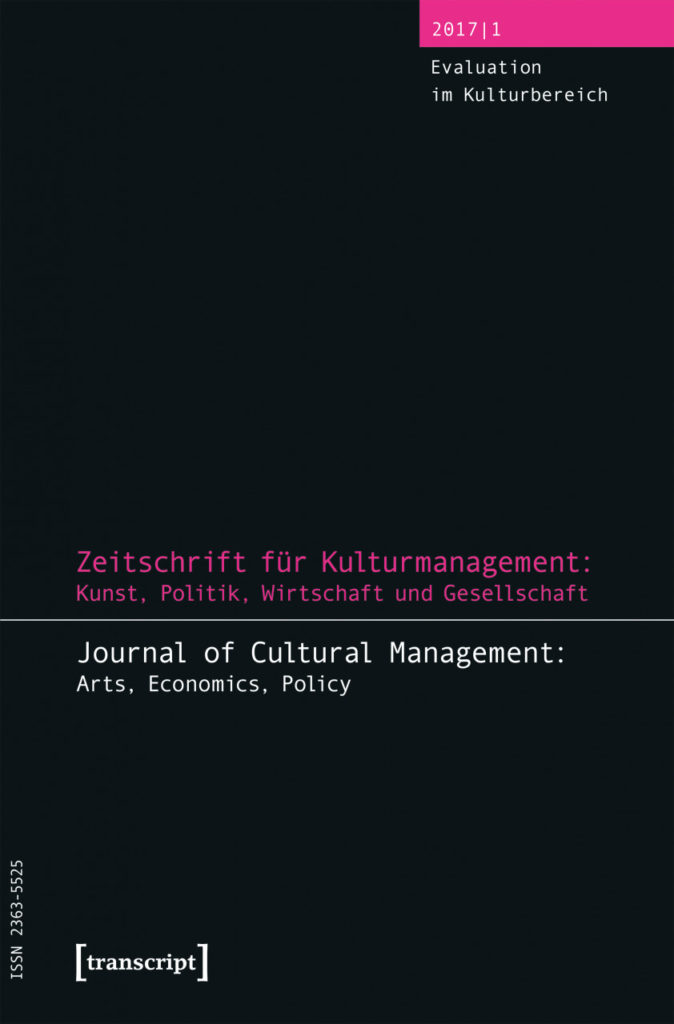Case Study
Means-end-Evaluation am Beispiel des Technorama
Abstract
According to the latest research into public management, for public value to be created it is necessary for the related activities to have an effect on the personal attitudes and values of individuals. In the means-end evaluation discussed in this article, the actions of public institutions focus on those who directly benefit from cultural projects or artifacts: listeners, viewers, readers, or visitors. Using the example of the Swiss Science Center Technorama, it is shown how laddering can uncover the values that are associated with an institution and its purpose. The insights gained by this method can be used both to evaluate and, if necessary, legitimize publicly funded programs and to promote the development of cultural programs that appeal to the public.
Keywords
2017 (1)
Evaluation im Kulturbereich

Related Articles
Money Talks
Über die Nichtneutralität von Geld in der KulturfinanzierungJournal of Cultural Management 2015 (2)
Research Article
Journal of Cultural Management and Cultural Policy
Essay
Darwin in der Oper?
Ein evolutionstheoretischer Blick auf KulturYearbook for Culture Management 2010
Research Article
‚Creative Quarters‘ und die Paradoxie von Stadtplanung
Yearbook for Culture Management 2011
Research Article
Potential for the Further Development of the Lifestyle Approach for Cultural Practice
Journal of Cultural Management and Cultural Policy 2024
Research Article
Lernen braucht Mut
Evaluation in der kulturellen BildungJournal of Cultural Management 2017 (1)
Essay
© 2026, Journal of Cultural Management and Cultural Policy
Keywords
- Aesthetics
- Higher Education
- Cultural Diplomacy and Foreign Cultural Policy
- Occupation
- Career and Professional Role
- Audience Development
- Audience Studies and Visitor Studies
- Visitor Motivations
- Business
- Covid Pandemic
- Democracy
- Digitalization
- Diversity
- Third Sector
- Empirical Aesthetics
- Development
- Ethics
- Evaluation
- Field Theory
- Festival
- Film
- Federalism
- Community Arts
- Societal Change
- Ideology
- Staging
- Career
- Communication
- Concert
- Creative Industries
- Creativity
- Crisis
- Culture
- arts organizations, cultural organizations
- Cultural Participation
- Cultural Change
- Fincancing The Arts
- Cultural Promotion Law
- Cultural History
- Cultural Management
- Cultural Economy
- Cultural Organizations
- Art Education
- Cultural Policy
- Cultural Production
- Cultural Sociology
- Art Education
- Cultural Understanding
- Arts Administration
- Cultural Industry
- Cultural Sciences
- Art
- Art Field
- Arts Research
- Artists
- Artistic Research
- Artistic Reputation
- Arts Management
- Arts Organizations
- Art education
- Arts Marketing
- Arts Administration
- Curating
- Leadership
- Literature
- Advocacy
- Management
- Marketing
- Market
- Media
- Methods Development
- Mexico
- Monumentalizing
- Museum
- Music
- Non-Visitor Studies
- Opera
- Orchestra
- Organization
- Political Expression
- Post-truth Politics
- Professional Role
- Audience
- Audience Development
- Law
- Government
- Role
- Socially Engaged Art
- Social Cohesion
- Social Change
- Social Cohesion
- Non-visitor Socio-demographics
- Socioculture
- State
- Symbolic capital
- Dance
- Participatory Justice
- Theatre
- Theatre Governance
- Theory Development
- Tourism
- Transformation
- Survey
- Entrepreneurship
- Urbanism
- Civil Society


